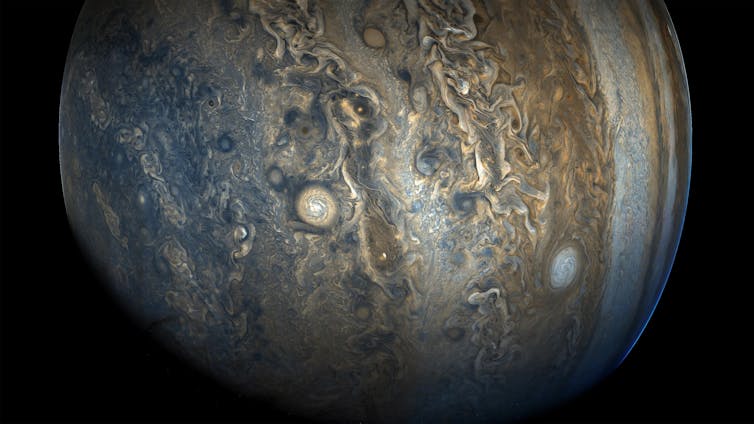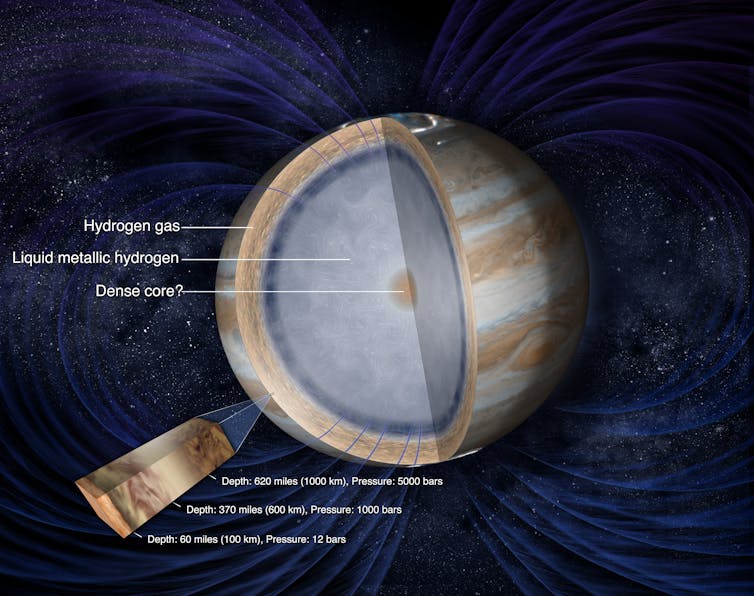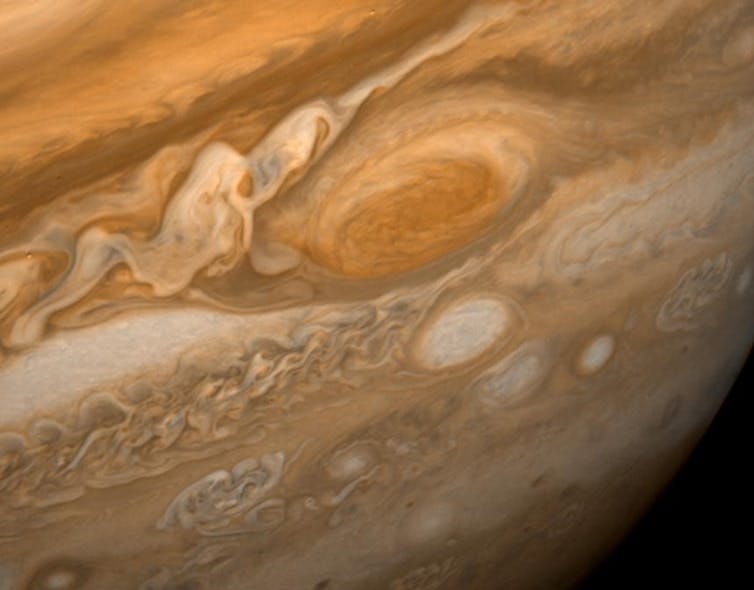Why does Jupiter appear like it has a floor – despite the fact that it doesn’t have one? – Sejal, age 7, Bangalore, India
The planet Jupiter has no stable floor – no floor, just like the grass or dust you tread right here on Earth. There’s nothing to stroll on, and no place to land a spaceship.
However how can that be? If Jupiter doesn’t have a floor, what does it have? How can it maintain collectively?
At the same time as a professor of physics who research all types of bizarre phenomena, I understand the idea of a world with out a floor is troublesome to fathom. But a lot about Jupiter stays a thriller, at the same time as NASA’s robotic probe Juno begins its ninth 12 months orbiting this unusual planet.
Jupiter’s mass is two-and-a-half occasions that of all the opposite planets within the photo voltaic system mixed.
First, some info
Jupiter, the fifth planet from the Solar, is between Mars and Saturn. It’s the biggest planet within the photo voltaic system, sufficiently big for greater than 1,000 Earths to suit inside, with room to spare.
Whereas the 4 inside planets of the photo voltaic system – Mercury, Venus, Earth and Mars – are all made from stable, rocky materials, Jupiter is a gasoline large with a composition just like the Solar; it’s a roiling, stormy, wildly turbulent ball of gasoline. Some locations on Jupiter have winds of greater than 400 mph (about 640 kilometers per hour), about thrice quicker than a Class 5 hurricane on Earth.

A photograph of the southern hemisphere of Jupiter, taken by NASA’s Juno spacecraft in 2017.
NASA/JPL-Caltech/SwRI/MSSS/Gerald Eichstadt/Sean Doran
Looking for stable floor
Begin from the highest of Earth’s ambiance, go down about 60 miles (roughly 100 kilometers), and the air stress repeatedly will increase. Finally you hit Earth’s floor, both land or water.
Examine that with Jupiter: Begin close to the highest of its principally hydrogen and helium ambiance, and like on Earth, the stress will increase the deeper you go. However on Jupiter, the stress is immense.
Because the layers of gasoline above you push down an increasing number of, it’s like being on the backside of the ocean – however as an alternative of water, you’re surrounded by gasoline. The stress turns into so intense that the human physique would implode; you’d be squashed.
Go down 1,000 miles (1,600 kilometers), and the new, dense gasoline begins to behave surprisingly. Ultimately, the gasoline turns right into a type of liquid hydrogen, creating what could be regarded as the biggest ocean within the photo voltaic system, albeit an ocean with out water.
Go down one other 20,000 miles (about 32,000 kilometers), and the hydrogen turns into extra like flowing liquid steel, a fabric so unique that solely not too long ago, and with nice issue, have scientists reproduced it within the laboratory. The atoms on this liquid metallic hydrogen are squeezed so tightly that its electrons are free to roam.
Remember the fact that these layer transitions are gradual, not abrupt; the transition from regular hydrogen gasoline to liquid hydrogen after which to metallic hydrogen occurs slowly and easily. At no level is there a pointy boundary, stable materials or floor.

An illustration of Jupiter’s inside layers. One bar is roughly equal to the air stress at sea degree on Earth.
NASA/JPL-Caltech
Scary to the core
Finally, you’d attain the core of Jupiter. That is the central area of Jupiter’s inside, and to not be confused with a floor.
Scientists are nonetheless debating the precise nature of the core’s materials. Essentially the most favored mannequin: It’s not stable, like rock, however extra like a sizzling, dense and presumably metallic combination of liquid and stable.
The stress at Jupiter’s core is so immense that it will be like 100 million Earth atmospheres urgent down on you – or two Empire State buildings on prime of every sq. inch of your physique.
However stress wouldn’t be your solely downside. A spacecraft making an attempt to succeed in Jupiter’s core could be melted by the acute warmth – 35,000 levels Fahrenheit (20,000 levels Celsius). That’s thrice hotter than the floor of the Solar.

A picture taken of Jupiter by Voyager 1. Notice the Nice Pink Spot, a storm massive sufficient to carry three Earths.
NASA/JPL
Jupiter helps Earth
Jupiter is a bizarre and forbidding place. But when Jupiter weren’t round, it’s potential human beings won’t exist.
That’s as a result of Jupiter acts as a defend for the inside planets of the photo voltaic system, together with Earth. With its large gravitational pull, Jupiter has altered the orbit of asteroids and comets for billions of years.
With out Jupiter’s intervention, a few of that house particles might have crashed into Earth; if one had been a cataclysmic collision, it might have precipitated an extinction-level occasion. Simply have a look at what occurred to the dinosaurs.
Possibly Jupiter gave an help to our existence, however the planet itself is very inhospitable to life – at the very least, life as we all know it.
The identical is just not the case with a Jupiter moon, Europa, maybe our greatest probability to search out life elsewhere within the photo voltaic system.
NASA’s Europa Clipper, a robotic probe launching in October 2024, is scheduled to do about 50 fly-bys over that moon to review its monumental underground ocean.
May one thing be dwelling in Europa’s water? Scientists gained’t know for some time. Due to Jupiter’s distance from Earth, the probe gained’t arrive till April 2030.
And since curiosity has no age restrict – adults, tell us what you’re questioning, too. We gained’t be capable to reply each query, however we’ll do our greatest.



